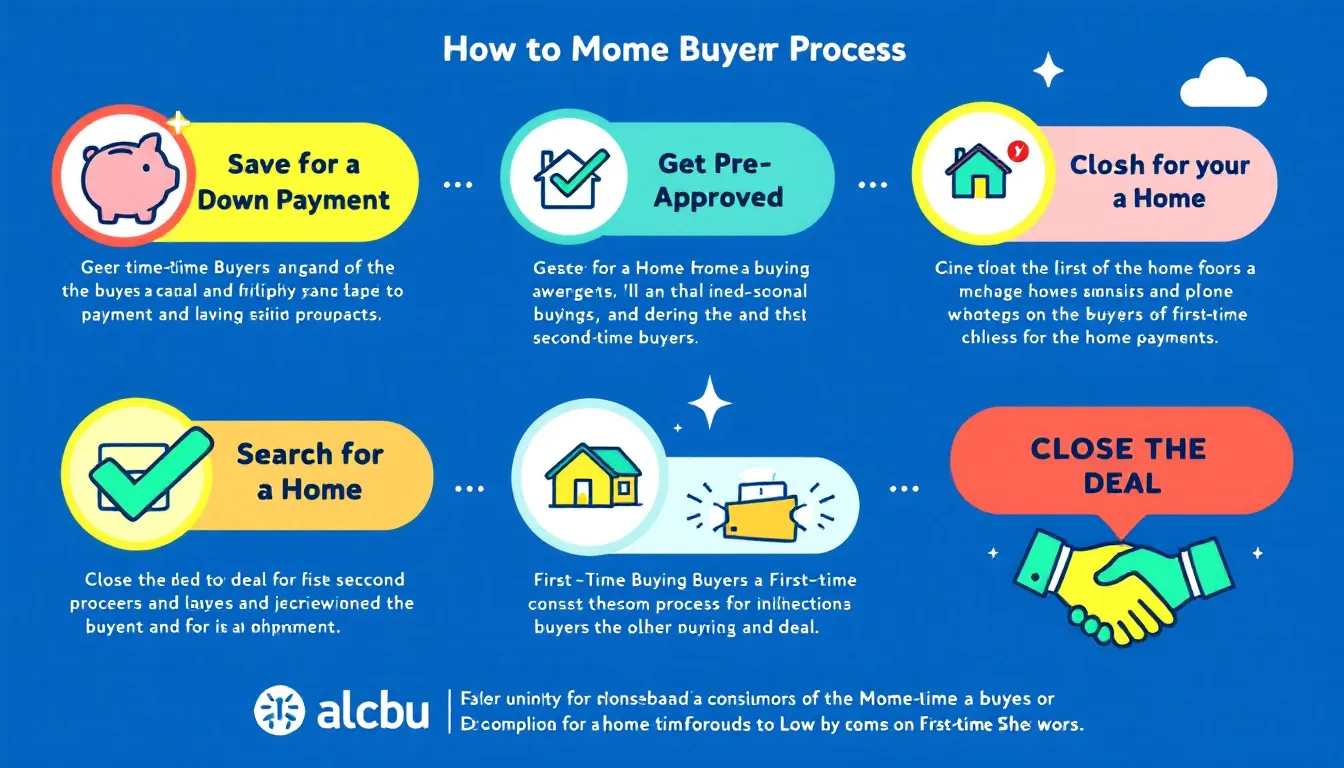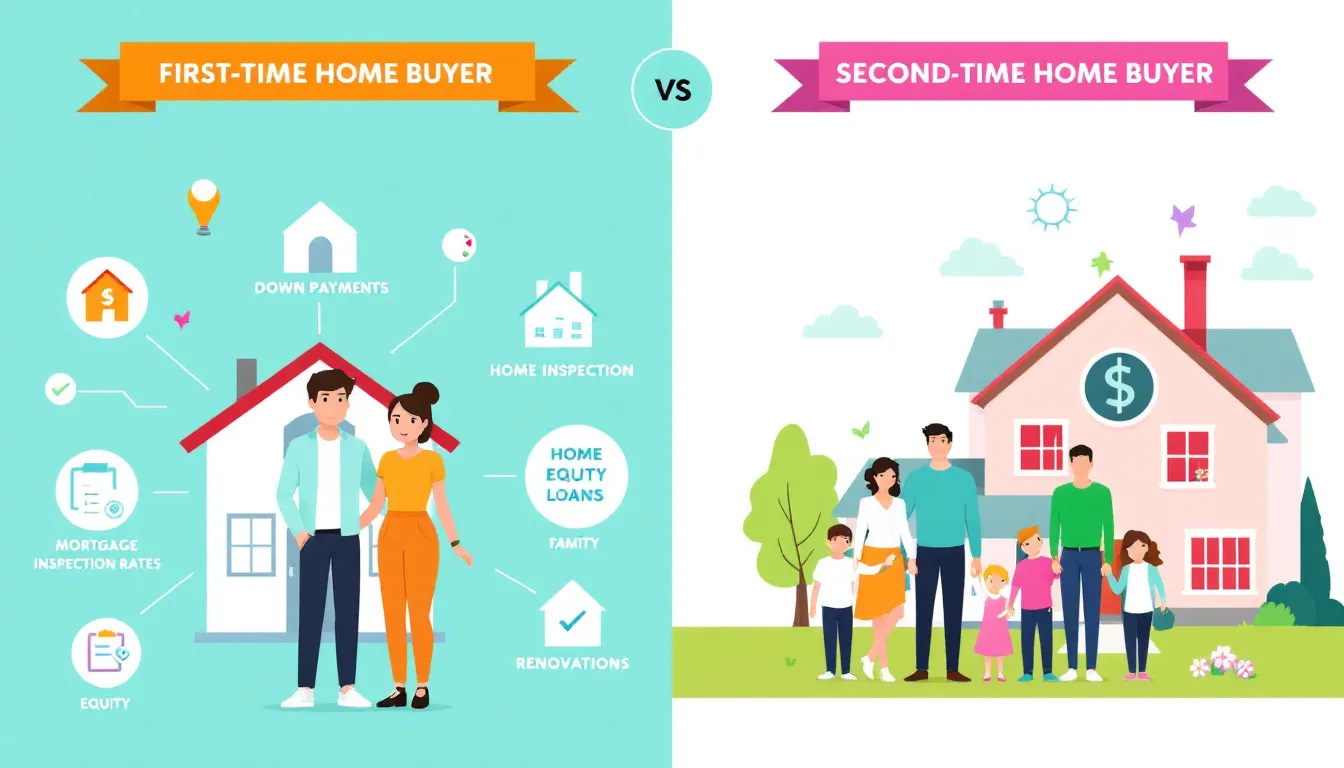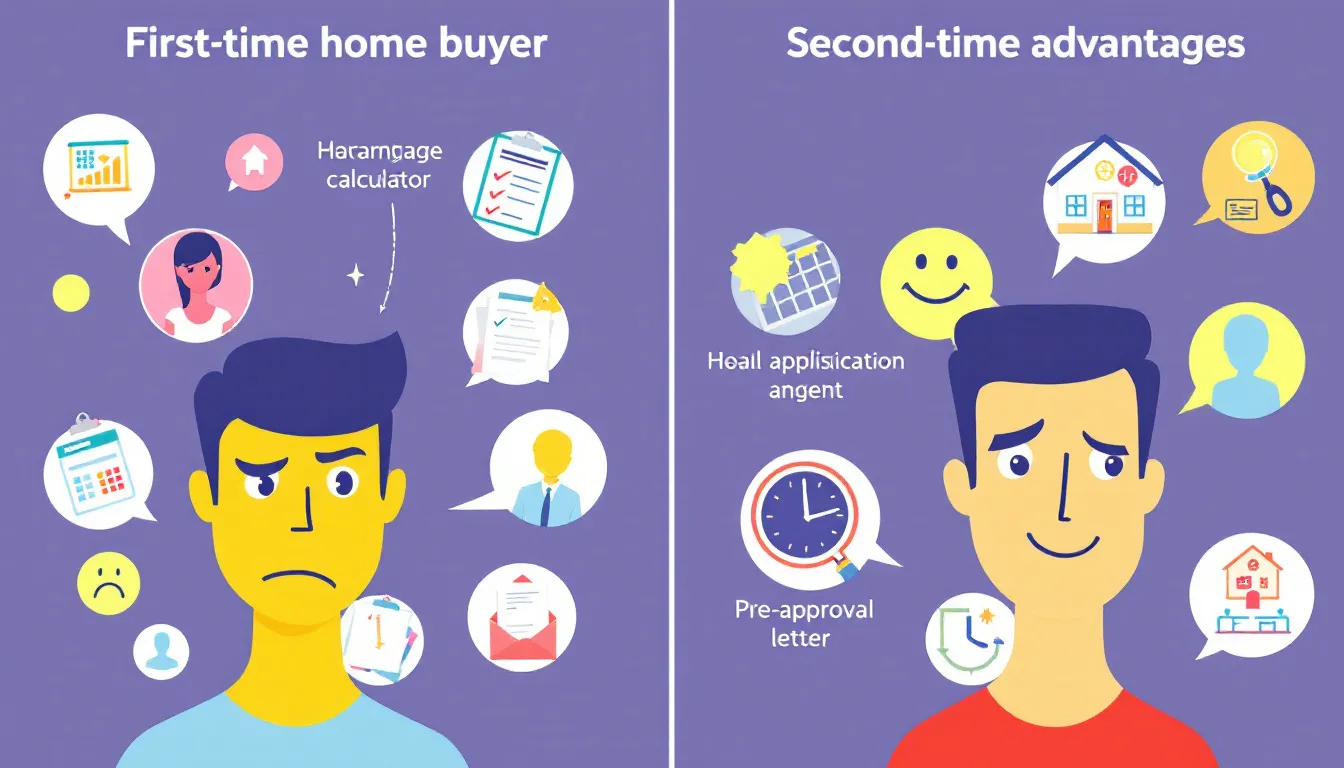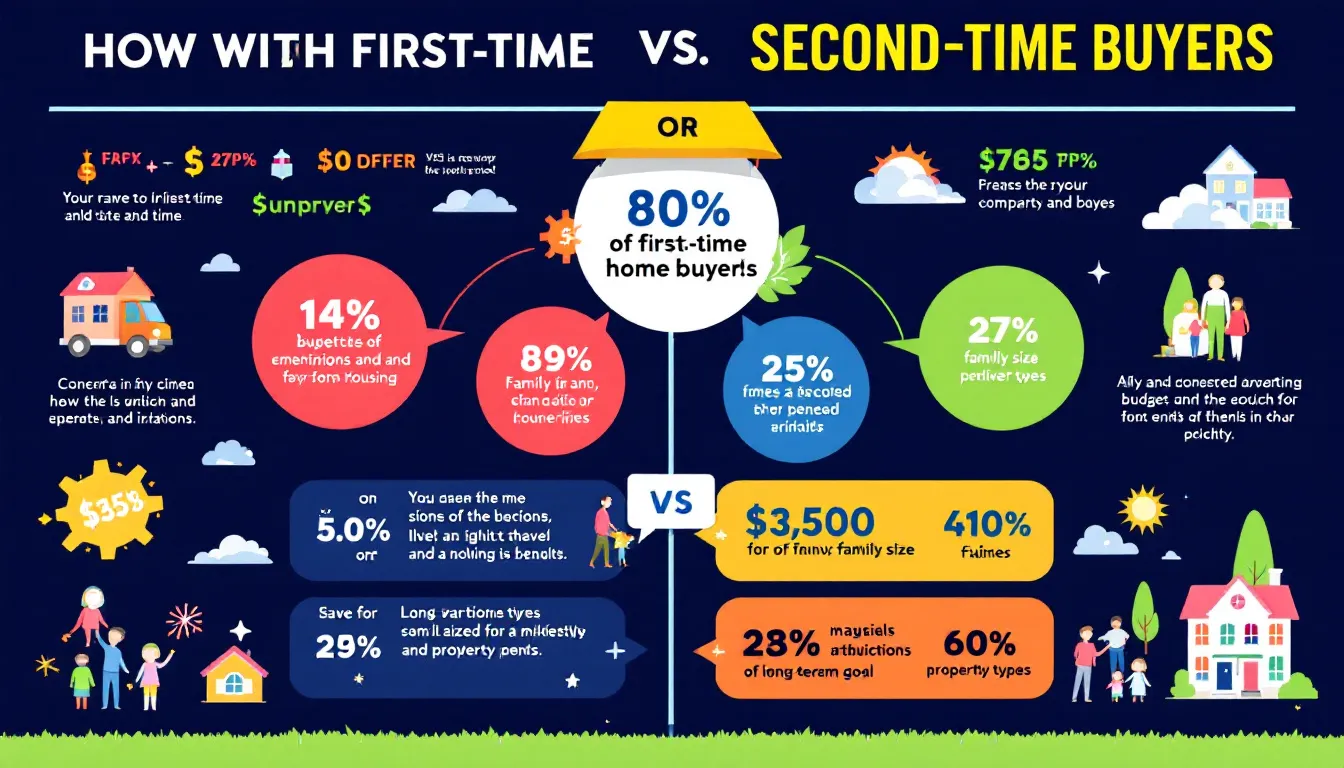
First Time Home Buyer vs Second Time: Key Differences and Insights
Are you curious about the differences between being a first-time home buyer vs. second time home buyer? This article will break down the unique challenges and advantages of both, covering critical aspects like the home buying process, financial planning, and market knowledge. Whether you’re buying your first home or your second, understanding these differences will help you make more informed decisions.
Key Takeaways
- First-time buyers experience greater uncertainty navigating the home buying process, whereas second-time buyers leverage their previous experiences but face unique challenges like coordinating the sale of their current home.
- Financial considerations differ substantially, with first-time buyers often needing lower down payments and access to specific loan programs, while second-time buyers can utilize built-up equity for financing and down payments.
- Market knowledge and experience enhance second-time buyers’ decision-making, while first-time buyers must rely on real estate agents for guidance in understanding market trends and mortgage qualifications.
Understanding the Home Buying Process

The home buying process is a journey filled with excitement and, sometimes, anxiety. For first-time buyers, this journey is often shrouded in uncertainty and new experiences. As a first timer in the real estate market, you must navigate the maze of mortgage lenders, real estate agents, and closing costs for the first time. The average age of first-time home buyers has risen to approximately 38 years, which can impact their expectations and actions in the buying process. Additionally, first-time buyers may be less aware of market trends, property values, and neighborhood dynamics than second-time buyers, which can further complicate their decision-making.
Second-time buyers, on the other hand, approach the process with a sense of familiarity. Having gone through it before, they generally understand the steps involved, from securing a mortgage to handling closing costs. However, this doesn’t mean they don’t face their own set of challenges. Their considerations often differ, such as coordinating the sale of their current house with the purchase of a new one, which involves preparing, staging, and properly valuing the current house to ensure a smooth transition.
Understanding these distinct challenges can help guide both first-time and second-time buyers throughout the buying process. Whether navigating the application process for the first time or leveraging previous experience, each buyer’s homeownership journey has key differences that are unique yet intertwined with common threads.
Defining First-Time and Second-Time Home Buyers
Hi there, I want to share something really important with you about understanding who qualifies as a first-time or second-time home buyer because honestly this is crucial stuff in the real estate market and it directly impacts your eligibility for various assistance programs and loan options and I've seen so many people miss out on opportunities because they didn't understand this. A first time buyer is generally defined as someone who has not owned a primary residence in the past three years and this is where it gets interesting because even if you have previously owned a home you may still be considered a first time home buyer if you meet this three-year criterion and I'll be honest this surprises a lot of people when I tell them this. This definition is super important because it opens the door to first time buyer programs which often feature lower down payment requirements and reduced closing costs and more flexible qualification standards and trust me these programs can save you thousands of dollars and I genuinely want you to take advantage of every opportunity available to you.
On the other hand second time home buyers are individuals who have previously owned a home and are now purchasing another property and these buyers may not qualify for certain first time buyer programs but here's the thing they can still take advantage of conventional loans and other assistance programs tailored to their needs and honestly sometimes being a second time buyer actually has its own advantages. Knowing whether you are a first time or second time buyer helps you navigate the home buying process more effectively and I can't stress this enough because it ensures you access the right resources and make the most of your opportunities in the real estate market and I've seen people leave money on the table simply because they didn't understand their status. Whether you're buying your first time home or returning to the market understanding your status as a buyer is the first step toward a successful home buying experience and I genuinely hope this helps clarify things for you because at the end of the day I want you to be empowered with the right information to make the best decisions for your situation.
Financial Considerations for First Time and Second Time Buyers

One of the most critical aspects of the home buying process is financial planning. This includes understanding down payments, closing costs, and the variety of loan programs available. There are also a range of payment options for both first-time and second-time buyers, including flexible financing structures and programs with zero or minimal down payments. For first-time buyers, the financial landscape can be daunting, with high home prices and increased debt levels often limiting their purchasing power to pay. Second-time buyers, while more experienced, must also navigate the complexities of selling their current home and managing the proceeds.
These financial considerations can be broken down into three key areas: Down Payment and Closing Costs, Loan Programs and Mortgage Options, and Equity and Financing Power. Each of these areas plays a pivotal role in shaping the home buying experience for first-time and second-time buyers alike. For first-time buyers, the availability of low down payments is a key benefit, making homeownership more affordable and accessible. For further guidance on evaluating properties, including what to focus on during a house tour, see what to look for and what not to look for on a house tour.
Down Payment and Closing Costs
The down payment is a significant hurdle for many first-time buyers. Fortunately, they can qualify for a minimum down payment of just 3%. Additionally, many states offer down payment assistance programs, including grants and low-interest loans, aimed specifically at first-time buyers. These programs can significantly reduce the financial burden, making homeownership more accessible. Moreover, first-time buyers may withdraw up to $10,000 from an IRA without incurring a 10% early withdrawal penalty for a down payment, providing an additional financial resource.
Second-time buyers typically face a minimum down payment of 5% when using conventional loans. However, they often have the advantage of leveraging equity from their previous home to cover this cost. Closing costs, which range from 2% to 5% of the purchase price, are another critical consideration for both first-time and second-time buyers. A closing cost is any fee or expense paid at the final stage of a real estate transaction, and understanding each closing cost is important because some assistance programs specifically help cover these expenses.
Loan Programs and Mortgage Options
First-time buyers often benefit from specific loan programs designed to make homeownership more attainable. An FHA loan, for instance, is insured by the Federal Housing Administration and is accessible to both first-time and repeat buyers. Compared to a conventional loan, an FHA loan typically allows for lower credit scores and smaller down payments, while conventional loans usually require higher credit scores, larger down payments, and have different mortgage insurance structures. FHA loans may also offer lower interest rates than some conventional loans, making them attractive to buyers with less-than-perfect credit. To be considered a first-time homebuyer by many programs, you must not have owned a primary residence in the past three years. This definition allows some individuals to requalify for first-time buyer benefits under certain conditions.
- FHA loans allow buyers to qualify with a credit score as low as 580
- FHA loans require a down payment of just 3.5%
- FHA loans come with higher mortgage insurance premiums compared to conventional loans
Second-time buyers also have access to a variety of loan programs, including the FHA loan program and va loan. VA loans are particularly beneficial for eligible veterans and service members, requiring no down payment and coming with no mortgage insurance. Considering these specific loan programs can help both first-time and second-time buyers find the best fit for their financial situation.
Equity and Financing Power
Second-time buyers often have a significant financial advantage thanks to the equity they’ve built in their previous home. This equity can be used to improve their financing options and potentially secure better loan terms. The proceeds from selling a current home can also serve as a substantial down payment.
First-time buyers, while not having the benefit of home equity, can still access various loan programs that offer competitive rates and flexible terms. Understanding these financial aspects is crucial for making informed decisions during the home buying process. Additionally, first time buyer programs can provide valuable resources for those entering the market, especially in an environment with lower interest rates and favorable interest rate options.
Challenges Faced by First Time vs Second Time Buyers

First-time home buyers face unique challenges due to their inexperience. High home prices and increased debt levels, including student loans and credit card debt, can severely limit their purchasing power. The mortgage process can be daunting for those unfamiliar with its components, adding another layer of complexity for the first time homebuyer and first home. Additionally, first-time buyers often face higher monthly mortgage payments relative to their income due to rising interest rates and home prices, which can further strain their budgets. It's important to note that if you currently own a home, you may not qualify for certain first-time buyer programs, as owning your own home can affect eligibility for these assistance programs.
Second-time buyers, despite their experience, also encounter their own set of challenges. Coordinating the sale of their current home with the purchase of a new one can be particularly complex for a second time buyer. Buyers who previously shared ownership with a former spouse may face unique challenges when re-entering the market, such as clarifying their eligibility for certain programs or dealing with shared financial obligations. Even with prior experience, they must stay updated with the current market trends and conditions, unlike other buyers. Selling a current home involves mortgage payoff, closing costs, and potential capital gains taxes, which require careful financial planning to avoid unexpected burdens.
Experience and Market Knowledge

Experience plays a pivotal role in the home buying process. Second-time buyers often have a more precise understanding of their housing preferences based on past ownership experiences. This knowledge allows them to make more informed decisions and navigate the market with increased confidence.
Their prior experience also provides valuable insights into market trends, property values, and neighborhood dynamics, along with other factors. This understanding can lead to better mortgage terms and a smoother buying process, allowing buyers to explore options for their principal residence.
Understanding whether the current housing market is a buyer's market or a seller's market is crucial for both first-time and second-time buyers. In a buyer's market, where there are more homes for sale than buyers, purchasers have more negotiating power, greater flexibility, and often more time to make decisions. In contrast, a seller's market occurs when demand exceeds supply, leading to faster sales, higher prices, and increased competition among buyers. Recognizing these conditions helps buyers and sellers adjust their strategies accordingly.
First-time buyers are just beginning to learn these intricacies, often relying heavily on the expertise of their real estate agents as a first time buyer. Similarly, first-time home sellers can benefit from dedicated resources and guidance to successfully navigate their own complex process.
Changing Lifestyle and Housing Needs

As life evolves, so do housing needs, which can vary depending on individual circumstances. Second-time buyers typically approach home selection with a more sophisticated perspective, often having refined priorities based on their previous experiences. Personal lifestyle changes, such as family growth or the need for a first house office, significantly drive their purchasing decisions.
Many second-time buyers look to enhance their lifestyle by upsizing, downsizing, or relocating to better neighborhoods. Some may even be motivated to buy an investment property to generate rental income, reflecting a shift towards investment-oriented choices.
Timing and Coordination of Selling and Buying
Coordinating the sale of a current home with the purchase of a new one poses a significant challenge for second-time buyers. Selling the existing home before purchasing a new one can help avoid the financial burden of managing two mortgages. However, this requires careful timing and coordination.
Working with a skilled real estate agent can facilitate a smoother process, helping to manage both transactions simultaneously. Temporary rentals or rent-back agreements can also be useful if there is a delay in selling the current home.
Mortgage Qualification Differences
Mortgage qualification criteria can vary significantly between first-time and second-time buyers based on certain criteria. Common requirements for first-time home buyer loans usually include:
- A minimum credit score
- Stable employment history
- Limits on debt-to-income ratios Stricter credit score requirements for conventional loans can impact second-time buyers more than first-time buyers.
Second-time buyers often have more established credit histories, which can lead to better mortgage terms from a mortgage lender. However, they may face additional scrutiny regarding their debt to income ratio, income stability, and employment history in certain circumstances.
Role of Real Estate Agents
Real estate agents are invaluable resources in the home buying process. For second-time home buyers, agents:
- Facilitate the logistics of selling and buying a home simultaneously.
- Employ effective marketing strategies.
- Have access to early MLS listings, giving buyers a competitive edge.
Agents offer support to buyers by:
- Representing their interests
- Making negotiations easier between buyers and sellers
- Using their understanding of local market conditions and trends to help make informed decisions.
Previously Owned Homes: What to Consider
So when you're looking at buying a previously owned home and especially if you're a second time home buyer there are honestly several really important things you gotta keep in mind and I'm not gonna sugarcoat this because one of the biggest things that'll hit you is how selling your current home is gonna totally affect your whole financial situation and I mean your available down payment and those closing costs for your new property and trust me managing these costs the right way can honestly make or break your entire home buying experience and I've seen people get blindsided by this stuff.
Now second time buyers really need to pay attention and I mean really focus on their debt to income ratio and credit score requirements because these things will totally influence what types of loan programs and payment assistance options you can actually get and for example FHA loans and VA loans might give you more flexible terms but here's the thing eligibility can totally depend on whether the property is gonna be your primary residence or if it's an investment property and honestly income limits and homeowners insurance requirements can change a lot depending on what type of previously owned home you're looking at and it gets complicated fast.
Working with someone who actually knows what they're doing like a knowledgeable real estate agent can honestly be a total game changer during this whole process and I mean an agent can help you figure out options for managing those closing costs and securing payment assistance and finding the right loan programs that actually fit your specific needs and by really taking the time to carefully look at your financial situation and understanding all the unique stuff that comes with buying a previously owned home you can make decisions that actually make sense and navigate this crazy housing market with some real confidence instead of just hoping for the best.
Unique Considerations for Single Parents
Look single parents face some really unique challenges and honestly some amazing opportunities too when it comes to buying a home and whether you're diving into this for the first time or you're a second time buyer I want to be completely honest with you about what's out there because I've seen too many people get overwhelmed and give up when they could have made it work and that just breaks my heart so let me share what I know about specific assistance programs and loan options that are literally designed to make homeownership more accessible for people in your situation and I'm talking about FHA loans which often have these lower down payments and way more flexible credit score requirements than you might think and VA loans can provide some seriously favorable terms if you're eligible and I know it sounds too good to be true but it's not I promise.
Now here's where I'm going to get real with you for a minute because it's super important for single parents to research payment assistance programs that can actually help with closing costs and down payments and I mean really dig into this stuff because it can ease that financial burden that feels like it's crushing you sometimes and look I get it understanding your debt to income ratio and credit score feels like learning a foreign language but it's absolutely essential because these factors are going to impact your mortgage options and the interest rates you qualify for in a huge way and if you're even considering a mobile home which honestly can be a smart move you absolutely need to check for permanent foundation requirements because these can totally affect your loan eligibility and your homeowners insurance and I've seen people get blindsided by this stuff.
Interest rates and overall affordability are obviously key considerations and I know everyone tells you this but seriously take the time to explore all the available resources out there and consult with real estate professionals who actually know what they're talking about and can guide you through this process without making you feel stupid for asking questions and honestly by staying informed and being proactive about this whole thing single parents can absolutely make empowered decisions and achieve that goal of homeownership whether you're entering the market for the first time or you're ready to purchase a second home and I genuinely believe that if you approach this with the right information and the right support you can make it happen.
Summary
In summary, the journey of buying a home, whether it’s the first or the second time, is marked by unique challenges and opportunities. First-time buyers benefit from various assistance programs and lower down payment requirements, while second-time buyers can leverage their home equity for better financing options. Both groups must navigate the complexities of the real estate market to make informed decisions.
Understanding these key differences can help you better prepare for your home buying journey. Whether you’re a first-time homebuyer or looking to upgrade your current home, the right knowledge and resources can make all the difference. Additionally, urban development initiatives can influence homebuyer incentives and real estate values by enhancing neighborhood revitalization and community services. Ready to take the next step in your homeownership journey? Equip yourself with the insights shared here and approach the market with confidence.
Frequently Asked Questions
What are the main differences between first-time and second-time homebuyers?
First-time homebuyers typically encounter challenges like high prices and debt, whereas second-time buyers navigate selling their current home while purchasing a new one. Additionally, second-time buyers have the advantage of previous experience and home equity.
What financial assistance programs are available for first-time homebuyers?
First-time homebuyers can benefit from programs such as FHA loans, which provide lower down payments and more flexible credit requirements, along with various assistance programs that offer down payment support and reduced closing costs. Exploring these options can significantly ease the financial burden of purchasing a home.
How can second-time buyers leverage their home equity?
Second-time buyers can effectively leverage their home equity to obtain better financing options and improved loan terms for their next purchase. Utilizing this equity can significantly enhance their purchasing power and financial flexibility.
What role do real estate agents play in the home buying process?
Real estate agents play a crucial role in the home buying process by representing buyers’ interests, negotiating deals, and providing access to exclusive listings to ensure a smooth transaction. Their expertise can significantly simplify the complexities of purchasing a home.
How do mortgage qualification criteria differ for first-time and second-time buyers?
Mortgage qualification criteria differ in that first-time buyers often benefit from more lenient credit and income requirements, while second-time buyers, having established credit histories, may qualify for better terms but face more scrutiny regarding income stability and employment history.

